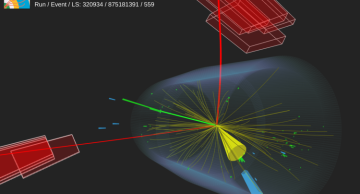A particle compatible with the Higgs boson of the standard model (SM) was observed in 2012 by the ATLAS and CMS Collaborations, with a mass of about 125 GeV. Could there be other heavier Higgs bosons, as predicted in some theories trying to…
The 2012 discovery of the Higgs boson at the CERN LHC was a milestone confirmation of the Standard Model, a theoretical framework that describes all the known elementary particles – the fundamental building blocks of our universe – and their…
Our current understanding of the nature of elementary particles and their interactions is encapsulated in what is known as the Standard Model (SM) of particle physics. Particles and interactions introduced in the SM have been measured with…
What do you do when you would like to play the newest computer game on your old computer, but the game is too demanding for your hardware? You own the previous version of the game and it was fun, but over the years it has grown long in the…
Image credit: Jennifer James (Vanderbilt)
Imagine going to an optician to check your vision. You are looking at a series of letters "E" in different orientations. When these letters get smaller and smaller, the horizontal lines in the "E" get closer…
The study of the Higgs boson is one of the main goals of the physics program of the CMS experiment. The data collected up to now at the LHC helped us to refine our understanding of the Higgs mechanism, which is responsible for the generation…
The completion of the standard model (SM) with the discovery of the Higgs boson stands as a resounding success in the world of particle physics. However, significant questions remain unanswered, such as the nature of dark matter (DM), and the…
Top quarks are the heaviest known elementary particles, as heavy as a tungsten atom. In high energy proton proton collisions at the LHC about 10 pairs of a top quark and its antiparticle are produced every second. But they are not here to…
Recent observations from experiments worldwide have reported anomalies in the decays of a bottom quark to a charm quark, a charged lepton (electron, muon, or tau), and the corresponding neutrino. These observations hint at possible deviations…
In 2012, the discovery of the Higgs boson marked a milestone in particle physics. It validated the standard model (SM) and unlocked new avenues of exploration. In 2022, the Higgs boson turned ten and the CMS experiment now presents a new…
The discovery of the Higgs boson represents a significant breakthrough in understanding the universe’s fundamental structure and dynamics. Despite this achievement, numerous profound mysteries persist, namely what is the nature of dark matter, why…
Did you know that every second more than 100 trillion tiny particles called neutrinos pass through your body without causing any harm? These mysterious particles are produced abundantly throughout the universe in events like nuclear reactions…












